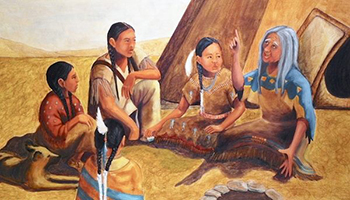From Our Archive
Debie Thomas, "Out on the Water" (2020); Dan Clendenin, "God Meant it for Good" (2017) and "Listening for God's Love" (2014).
For Sunday August 13, 2023
Lectionary Readings (Revised Common Lectionary, Year A)
Genesis 37:1-4, 12-28 or 1 Kings 19:9-18
Psalm 105:1-6, 16-22, 45b or Psalm 85:8-13
Romans 10:5-15
Matthew 14:22-33
This Week's Essay
The struggle isn’t being myself. It’s whether being myself is enough. My “self” is the constellation of identities that together form the person that I am. To list a few of my own identities, I am of Irish descent, raised in the mythical State of Jefferson, a husband, a philosopher, a student, a teacher, a friend, a cat parent, a son, and more. These identities only become a struggle for me when they are contested; that is, when either I fail to live up to the social expectations of an identity, or when others in my society find an identity utterly repellent.
Having my identity contested is not only something that happens to me; it is also something that I do to other people. We all privately assign qualities to the identities of those around us. Fleming Rutledge writes,
We can perceive people as beautiful, mature, open, caring, loving, loyal, and courageous, thereby declaring them worthy. Or, we can identify them as flaky, weird, uptight, devious, controlling, rigid, judgmental, and so forth — and we can rate them accordingly, always making sure that we compare ourselves favorably with the rating we give them.
When we contest the identity of another person, we rarely do so without a hidden motive of making ourselves superior in some way.
Despite its divine mandate to serve, the Church has been complicit in labeling people as not good enough. It’s particularly painful when the Church justifies derogation with a Bible verse, as if God is joining in the disapproval. How many of us cringe whenever Romans 3.23 is brought up, “For all have sinned and fallen short of the glory of God”? My anxiety gnarls as I dutifully insert the implied emphasis: especially me!
 |
|
Painting of Kiowa warrior, watercolor by White Buffalo, "Bobby Hill", 1972. |
Our epistle reading for this Sunday comes from the tenth chapter of St. Paul’s letter to the Church in Rome, but we must first address Paul’s words in Romans 3.23. There are two reasons I want to look at them. First, following a recurrent theme in my lectionary reflections, Romans 3 is another passage excluded from the RCL, so there are no opportunities to share it with our congregations. The absence of Romans 3 is a shame, being as it is a linchpin to Paul’s magisterial story of redemption in the letter. This Sunday is as good an opportunity as any to discuss it, which leads to my second reason: we cannot fully understand Romans 10 without it. So get your Bible and open to Romans chapter 3.
The misuse of Romans 3.23 to make people feel inferior or excluded bears a sad irony. For the verse is not a stand-alone sentence at all, and its context is one of absolute glorious liberation. The grammar of the NASB translation better shows how verses 21-25 are all one long sentence, though for readability, I’ll quote from the RSV, which uses two sentences:
21 But now the righteousness of God has been manifested apart from law, although the law and the prophets bear witness to it, 22 the righteousness of God through faith in Jesus Christ for all who believe. For there is no distinction; 23 since all have sinned and fall short of the glory of God, 24 they are justified by his grace as a gift, through the redemption which is in Christ Jesus, 25 whom God put forward as an expiation by his blood, to be received by faith.
How different verse 23 sounds in context! The very righteousness (“being good enough”) of God is freely given to all who believe, no matter what our identities happen to be. Why? Because “there is no distinction” between us when it comes to who needs God’s gracious love. Despite all the ways some people are made to feel inferior, no one is worse than anyone else. Verse 23 is about liberation, not condemnation! Paul is declaring a truly radical equality — achieved not by affirming that everyone’s identity is equally valued, but rather by insisting that no identity can by itself make us good enough. Those who have degraded us are brought down to our level, just as we are brought down to the level of those we castigate.
Yet this is not equality gained by feeling equally miserable about ourselves. Quite the opposite! Paul is addressing our fundamental human struggle, “How can I ever be free from anxiety about not being good enough?” (Fleming Rutledge). If we’re looking in our human identities for freedom from not being good enough, we’ll never find it, because no human identity will make us good enough. No one is any better off than anyone else. As such, everyone is equally offered an identity that is neither genetic nor earned nor purloined. Since all have sinned and fallen short, all who believe are justified by God’s grace given as a gift.
 |
|
Great Spirit Brings the Rain, by Carol Hagan.
|
My new favorite Bible translation is the First Nations translation of the New Testament, itself a gift to the Church. It replaces all names with their meanings, and speaks in a traditional Native American vernacular. The First Nations rendering of our passage marvelously captures the thrust of Paul’s declaration in Romans 3:
21 But there is a way to be in good standing with the Great Spirit that does not depend on us keeping tribal law! Even our Law and the Prophets have spoken the truth about this. 22 We can stand in a good way before the Great Spirit by trusting in Creator Sets Free (Jesus) the Chosen One and what he has done for us. This good standing is a gift to all who believe. It does not matter whether you are a Tribal Member or from any other nation. 23 We are all the same because all of us have followed our bad hearts and broken ways, 24 but because of the gift of his great kindness all of us are put in good standing with the Great Spirit through what Creator Sets Free (Jesus) has done to set us free and make us whole.
Paul’s approach to equality and inclusion differs importantly from our modern attitudes. Some of us make a distinction between favored and disfavored identities, pressuring people to join the favored identity. Others try to affirm every identity as equally favored, an impossible strategy because if we slip even once, we sow the seeds of doubt that maybe it is all pretense, not reality. Paul decisively demolishes both exclusion and doubt, contending that all exclusion is in vain (for we all have equally followed our bad hearts and broken ways) and that all doubt, even if true, doesn’t matter. Whoever we are, Creator Sets Free (Jesus) has given us a gift of a new identity that puts us in good standing with the Great Spirit.
Which leads us finally to Romans 10.5–15, our lectionary reading. All who confess that Creator Sets Free is Lord and has been raised by the Great Spirit from the dead will be saved. The ground of our confidence? There is no distinction between Jew and Greek; or in the First Nations translation, “It matters not whether one is a Tribal Member or from an Outside Nation, for the same one we call Chief is the Great Spirit of all people.” Just as our equality in Romans 3 is rooted in our equally broken ways, here our equality is rooted in the one Lord who is Lord of all and who is generous with all who call upon him. Christ-follower is our new identity. We are saved from the fear and condemnation that we might not be enough, because Christ is enough.
 |
|
Good Story Bringers.
|
As Christians, our calling is to share this Good News with all people. If there is no distinction as to who needs healing, then the free gift of healing is for everyone. When we consider how much of the strife and hatred we experience is rooted in contesting identities, in making some feel inadequate and others wholly erased, we cannot be timid about sharing the Good News that there is no distinction — all have sinned and all have one Lord — and therefore whoever calls upon Creator Sets Free will find the gift of an identity that is always enough and that does not depend on our effort or affirmation or social status. We no longer have to keep trying to be enough.
“How beautiful are the feet of the good story bringers, who tell about the good things Creator has done for us through the Chosen One!” (First Nations trans, Romans 10.15).
– Fleming Rutledge quotations taken from “Preaching without Distinction,” pp. 308–9 of her book Not Ashamed of the Gospel, a collection of her homilies on the Epistle to the Romans.
Weekly Prayer
Andrew Hudgins
We kneel. Some of us kneel better than others
and do not have to clutch the rail or sway
against those next to us. We hold up hands
to take the body in, and some of our hands
-- a few -- are firmer than the others. They
don't tremble, don't have to be held in the priest's
encircling hands and guided to our lips.
And some of us can hold the wafer, all of it,
inside our mouths. And when the careful priest
tips wine across our lips, many of us, for reverence,
don't moan or lurch or sing songs to ourselves.
But we all await the grace that's promised us.Andrew Hudgins is the author of numerous collections of poetry and essays, many of which have received high critical praise, such as The Never-Ending: New Poems (1991), which was a finalist for the National Book Awards; After the Lost War: A Narrative (1988), which received the Poets' Prize; and Saints and Strangers (1985), which was a finalist for the Pulitzer Prize. Hudgins is an elected member of the Fellowship of Southern Writers, and was the Humanities Distinguished Professor of English at The Ohio State University. He previously taught at Baylor University and the University of Cincinnati. Hudgins now lives in Sewanee, Tennessee, with his wife, the writer Erin McGraw.
Michael Fitzpatrick welcomes comments and questions via m.c.fitzpatrick@outlook.com
Image credits: (1) Cloudfront.net; (2) Pinimg.com; and (3) Allevents.in.





